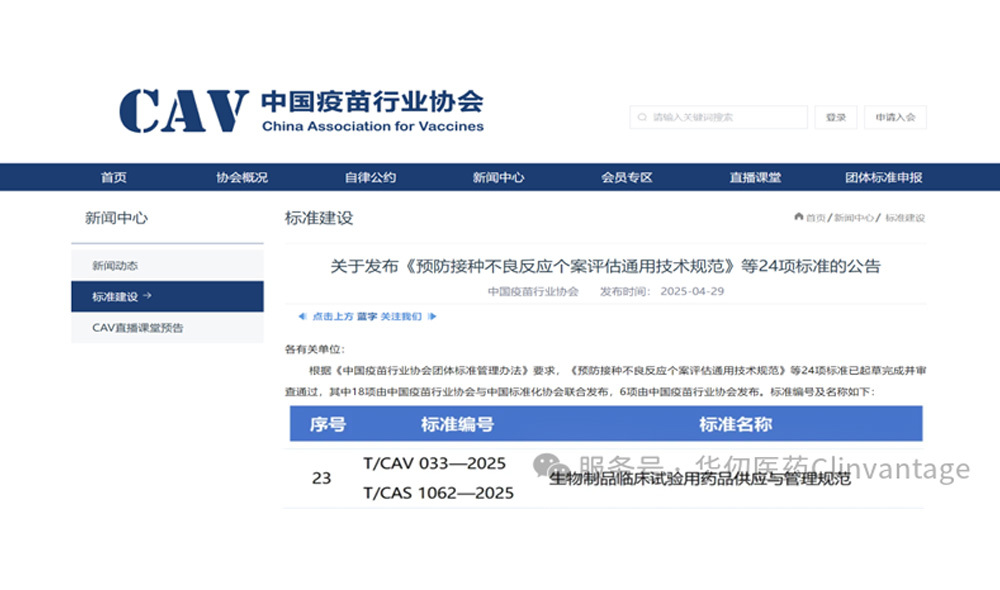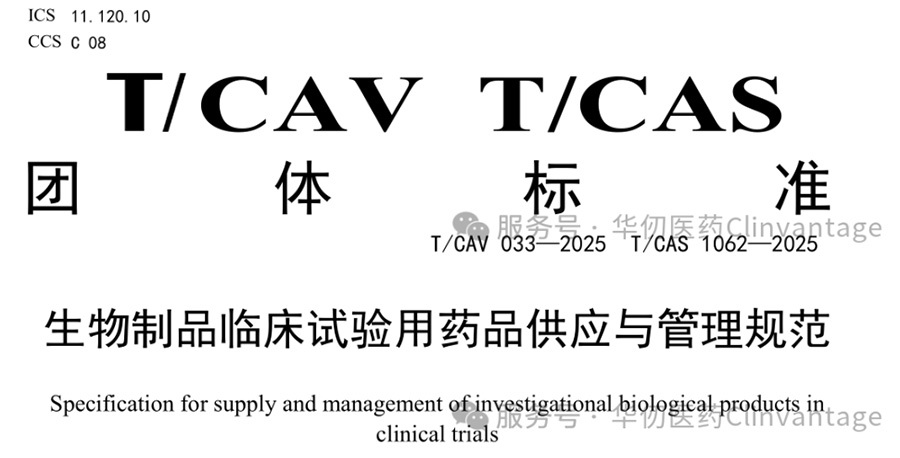Group Standard for the Supply and Management of Drugs Used in Clinical Trials of Biological Products Released (II)
Date:
2025-06-11
Source:

Clinvantage, a subsidiary of Huaren Pharmaceutical, participated in the development and drafting of the "Specifications for the Supply and Management of Drugs Used in Clinical Trials of Biological Products," jointly released by the China Vaccine Industry Association and the China Standardization Association. This document is a normative standard for the supply and management of drugs used in clinical trials of biological products in China.

7. Quality Management
7.1 Quality Management System
7.1.1 The service provider should establish a quality management system that balances risk control and efficiency, and establish a quality document system to ensure the efficient operation of the quality management system.
7.1.2 Quality management systems, standard operating procedures, etc., for clinical trial supplies should be established in accordance with GXP requirements, and regularly reviewed to assess whether revisions and updates are needed; updated documents should comprehensively consider the latest processes, applicable technical requirements, and regulatory requirements, and be able to trace the history of document revisions.
7.2 Document Management
7.2.1 All documents and records related to clinical trial supplies should be preserved, and documents and records should protect the privacy of subjects and the confidentiality of their related information.
7.2.2 All relevant parties should develop standard operating procedures for document management to ensure that all documents and records are authentic, complete, accurate, clear, traceable, and properly filed and stored.
7.2.3 For clinical trials used to apply for drug registration, essential documents should be kept for at least 5 years after the trial drug is approved for marketing; for clinical trials not used to apply for drug registration, essential documents should be kept for at least 5 years after the clinical trial is terminated. If the sponsor has special document retention requirements, the longer time specified in the requirements shall prevail.
7.2.4 All relevant parties should confirm that they have the location and conditions for storing essential documents, and the equipment for storing documents should have conditions such as preventing direct sunlight, waterproofing, and fire prevention, which are conducive to long-term preservation of documents.
7.2.5 Regardless of the medium in which the documents are stored, the documents should be easy to identify, locate, retrieve, and return to their proper place; the medium used to store the documents should ensure that the original data or its backup is preserved completely and legibly during the retention period, and regularly test or check the ability to restore and read, so as to avoid intentional or unintentional alteration or loss.
7.3 Risk Control
7.3.1 When changes occur in the storage warehouse, facilities and equipment, packaging materials, packaging, and labeling processes of clinical trial drugs and auxiliary drugs, the changes that may affect their safety should be evaluated, and the changes and evaluation results should be recorded to ensure that relevant activities are traceable.
7.3.2 The quality management system should investigate and evaluate deviations from processes, quality standards, and other deviations that may affect the quality of clinical trial drugs and auxiliary drugs, and keep corresponding records.
7.3.3 For complaints caused by quality problems of clinical trial drugs, the sponsor should jointly investigate with the clinical trial institution and the service provider to assess the potential impact on subject safety, clinical trials, and drug development. The release person in charge and the relevant personnel in charge of the clinical trial should participate in the investigation, and the investigation and handling process should be recorded. For complaints that cause drug quality problems, the quality managers of all relevant parties should provide a written root cause analysis (RCA) and corrective action and preventive action (CAPA) report, which will be closed after being approved by the sponsor.
7.4 Computerized Systems
7.4.1 System Design and Management
7.4.1.1 Relevant parties in clinical trial supplies should establish computerized systems. The computerized system should be able to effectively manage the supply data of clinical trial drugs, including procurement, receipt, acceptance, packaging and labeling, storage, distribution, return, and destruction, and provide traceable drug flow records to ensure that the source, destination, and use of each minimum package drug are traceable.
7.4.1.2 The computerized system should clearly define the responsibilities and permissions of system users and strictly control the access and modification permissions of data.
7.4.1.3 Computerized systems in the clinical trial supply process may include, but are not limited to, randomization and drug supply management systems, inventory management systems, transportation management systems, manufacturing execution systems, and temperature and humidity monitoring systems.
7.4.1.4 The inventory management system should be able to monitor in real time the inventory status of clinical trial drugs and auxiliary drugs, as well as packaging materials, and support accurate recording, inventory, and management of drugs and packaging materials. The system should have a monitoring mechanism to promptly identify and resolve inventory abnormalities or drug expiration issues.
7.4.1.5 The temperature and humidity monitoring system should have an automated alarm function to promptly warn of abnormal drug storage environments, equipment power outages, etc.
7.4.1.6 A unified interface standard should be established between various systems. Relevant parties can, according to the experimental design and the requirements of clinical trial drug supply and management, conduct data docking between different systems as needed, or query relevant records to improve trial efficiency, reduce costs, and strengthen compliance.
7.4.2 Data Management and Monitoring
7.4.2.1 The method of modifying computerized system data should be pre-defined, and the modification process should be completely recorded; the original data (such as retaining electronic data audit trails, data trails, and editing trails) should be retained; the name, description, representation format, and rules of electronic data should have unified and clear regulations to ensure the accuracy and integrity of electronic data acquisition; when the computerized system needs to be changed, such as software upgrades or data migration and integration, unified operating specifications should be clearly defined to ensure the integrity of electronic data.
7.4.3 Security Measures and Backup
7.4.3.1 All relevant parties should ensure that the computerized system is under security control, including user management, prevention and detection of security vulnerabilities, etc. Security measures include, but are not limited to, user authorization management, user verification requirements, password management, firewall settings, antivirus software, security patching, system monitoring, upgrades, and penetration testing.
7.4.3.2 All relevant parties should ensure the security, confidentiality, and prevention of modification of computerized system data, and use safe and effective methods for backup. At the same time, a disaster recovery plan should be developed and the integrity of backup data should be regularly checked.
7.4.3.3 Emergency procedures should be developed to prevent the loss or inaccessibility of important data.
7.4.4 Verification and Testing
7.4.4.1 The system should be verified, and control procedures should be developed to control changes; verification should demonstrate that the system meets the requirements of integrity, accuracy, and reliability, and is consistent with the expected performance.
7.4.4.2 Each relevant party is responsible for the verification status of its system throughout its entire lifecycle.
7.4.4.3 The verification procedures should cover the following: system design and functional testing, system release, system settings, installation and change control, exit, system data backup and data recovery, etc.
7.4.4.4 Each relevant party should retain the qualifications and verification documents of its computerized system developer.
7.4.4.5 Different system providers should provide user acceptance test scripts for the applicant to conduct pre-launch testing to ensure that different systems have consistent event definitions, smooth and coherent processes, and meet and cover actual user scenarios.
To be continued......
Related News
The "Specifications for the Supply and Management of Drugs Used in Clinical Trials of Biological Products," jointly issued by the China Vaccine Industry Association and the China Standardization Association, was developed and drafted with the participation of Huaren Pharmaceutical Clinvantage. It is a normative standard document in China for the supply and management of drugs used in clinical trials of biological products.
The "Specifications for the Supply and Management of Drugs Used in Clinical Trials of Biological Products," jointly issued by the China Vaccine Industry Association and the China Standardization Association, was developed and drafted with the participation of Huaren Pharmaceutical Clinvantage. It is a normative standard document in China for the supply and management of drugs used in clinical trials of biological products.
The "Specifications for the Supply and Management of Drugs Used in Clinical Trials of Biological Products," jointly issued by the China Vaccine Industry Association and the China Standardization Association, was developed and drafted with the participation of Huaren Pharmaceutical Clinvantage. It is a normative standard document in China for the supply and management of drugs used in clinical trials of biological products.
The "Specifications for the Supply and Management of Drugs Used in Clinical Trials of Biological Products," jointly issued by the China Vaccine Industry Association and the China Standardization Association, was developed and drafted with the participation of Huaren Pharmaceutical Clinvantage. It is a normative standard document in China for the supply and management of drugs used in clinical trials of biological products.
The "Specifications for the Supply and Management of Drugs Used in Clinical Trials of Biological Products," jointly issued by the China Vaccine Industry Association and the China Standardization Association, was developed and drafted with the participation of Huaren Pharmaceutical Clinvantage. It is a normative standard document in China for the supply and management of drugs used in clinical trials of biological products.



